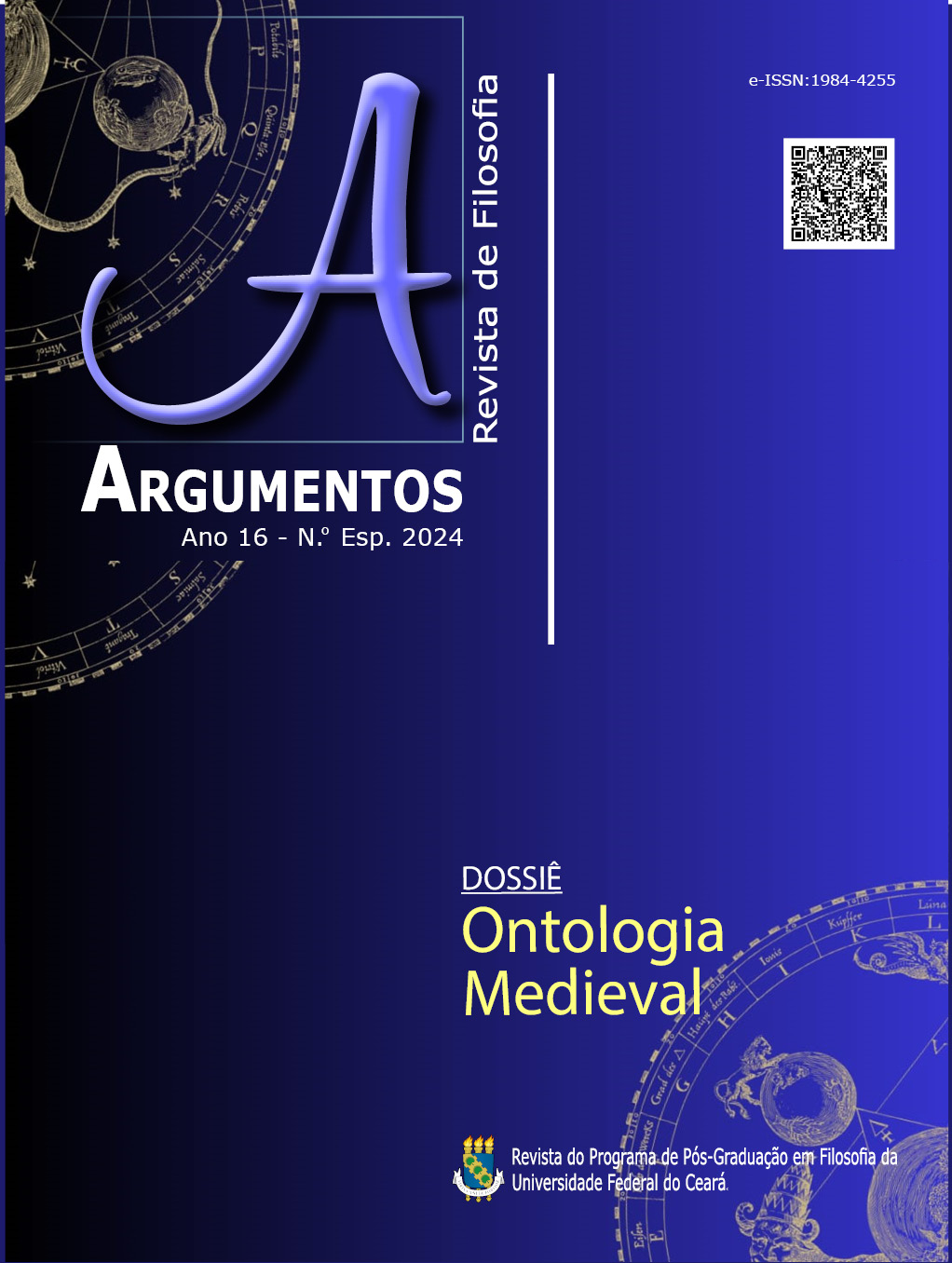Ontology, cosmology and epistemology: about the first principles of reality in Al-Fārābī
Keywords:
Al-Fārābī. Ontology. Epistemology. Cosmology. First Principles.Abstract
The present article aims to develop an analysis of the three ways in which the Muslim philosopher Abu Nasr al-Fārābī identifies the first principles of reality, namely: ontologically, cosmologically, and epistemologically. This proposal considers al-Fārābī’s philosophical categories to avoid potential confusion regarding the different ways the philosopher approaches the concepts of first principles. To this end, an examination of the three approaches will be conducted, following the exposition of the six principles (the First Cause, the Secondary Causes, the Agent Intellect, the Soul, form, and matter) according to the hierarchical sequence present within al-Fārābī’s philosophy. Along this line, in addition to studies on al-Fārābī’s thought, the analysis will emphasize the content found primarily in The Virtuous City (Mabādi’ arā ahl al-madīna al-fāḍila), The Book of Politics (Kitāb al-siyāsa al-madanīyya), and The Aphorisms of Political Science (Fusūl al-madanī) by al-Fārābī.
References
AL-FĀRĀBĪ, Abū Nasr. A Cidade Virtuosa. Tradução do árabe, introdução, notas e glossário de Catarina Belo. Lisboa: Fundação Calouste Gulbenkian, 2018.
AL-FĀRĀBĪ, Abū Nasr. Artículos de la ciência política. In: Obras filosóficas y políticas. Edición y traducción de Rafael Ramón Guerrero. Madrid: Liberty Fund y Editorial Trotta, 2008.
AL-FĀRĀBĪ, Abū Nasr. Catálogo de las ciências. Traducción de Ángel Gonzales Palencia. Madrid: CSIC, 1953.
AL-FĀRĀBĪ, Abū Nasr. L’êpitre surl’intellect. Traduction, introduction et notes de Dyala Hamzah. Paris: L’ Harmattan, 2001.
AL-FĀRĀBĪ, Abū Nasr. Libro de la política. In: Obras filosóficas y políticas. Edición y traducción de Rafael Ramón Guerrero. Madrid: Liberty Fund y Editorial Trotta, 2008.
AL-KINDῙ. Metafisica. In: Obras Filosóficas de al-Kindī. Traducción, introduccíon y notas de Rafael Ramón Guerrero y Emilio Tornero Poveda. Madrid: Coloquio, 1986.
ARISTÓTELES. Metafísica. Ensaio introdutório, texto grego com tradução e comentário de Giovanni Reale, tradução Marcelo Perine. São Paulo: Edições Loyola, 2014.
ATTIE FILHO, M. Falsafa, a filosofia entre os árabes. São Paulo: Palas Athena, 2002.
ATTIE FILHO, M. Notas e glossário. In: AVICENA. Livro da Alma. Tradução do árabe, introdução, notas e glossário de Miguel Attie Filho. Prefácio de Carlos Arthur Ribeiro do Nascimento. São Paulo: Globo, 2010.
DRUART, T. A. 1992. Al-Fārābī, Emanation, and Metaphysics. In: PARVIZ, M. Neoplatonism and Islamic Thought. Albany: Suny Press, 1992.
JANOS, D. Method, structure, and development in al-Farabi’s Cosmology. Leiden-Boston: Brill, 2012.
MAIMÔNIDES. Guia dos Perplexos (Parte 1). Tradução e prefácio de Uri Lam. São Paulo: Landy, 2004.
RAMÓN GUERRERO, R. El compromiso político de Al-Fārābī: ¿fue um filósofo šī’ī?. Actas de las II Jornadas de cultura arabe e islâmica. Madrid: Instituto Hispano-Árabe de Cultura, p. 463-477, 1985.
RAMÓN GUERRERO, R. Filosofía árabe y judia. Madrid: Editorial Síntesis, 2004.
RAMÓN GUERRERO, R. La Concepción del hombre en al-Fārābī. Miscelánea de Estudios Árabes y Hebraicos. Sección Árabe-Islam, Norteamérica, v. 23, p. 63-83. 1974.
RAMÓN GUERRERO, R. La recepción árabe del De Anima de Aristóteles: Al-Kindi y Al-Fārābī. Madrid: Consejos Superior de investigaciones científicas, 1992.
RAMÓN GUERRERO, R. Recepción de la Ética Nicomaquea en el mundo árabe: la teoria de la virtud en la Filosofía islâmica In Studia Graeco-arabica. Itália: Pacini Editore, 2014.
SILVA, F. G. P. A natureza onto-epistemológico da realidade segundo al-Fārābī. In: VASCONCELOS, M; VALENTIM, U. Rumo à sabedoria medieval: uma exploração dos filósofos da Idade Média. Toledo: Instituto Quero Saber, 2024.
Downloads
Published
Issue
Section
License
Copyright (c) 2024 Francisca Galileia Pereira da Silva, Virgínia Braga da Silva Santos

This work is licensed under a Creative Commons Attribution 4.0 International License.
Argumentos magazine is licensed under an International Creative Commons Attribution License.
The Magazine uses CC BY inclusion
1) The authors retain the copyright granted to the magazine or the right to initial publication, with the work regularly licensed under the Creative Commons Attribution, which allows the sharing of the work with acknowledgment of authorship and initial publication in this magazine.
2) The authors are authorized to contract additional applicable contracts, for non-exclusive distribution of the version of the work published in this journal (for example, publication in the institutional repository or as a chapter of the book), recognition of authorship and initial publication in this journal.
3) Authors are authorized and encourage to publish and distribute their work online (for example, in institutional repositories or on their personal pages) at any time before or during the editorial process, as they can generate productive changes, as well as increase the impact and reference of published work.




.jpg)










._._3.png)
1.jpg)
._._._.png)
